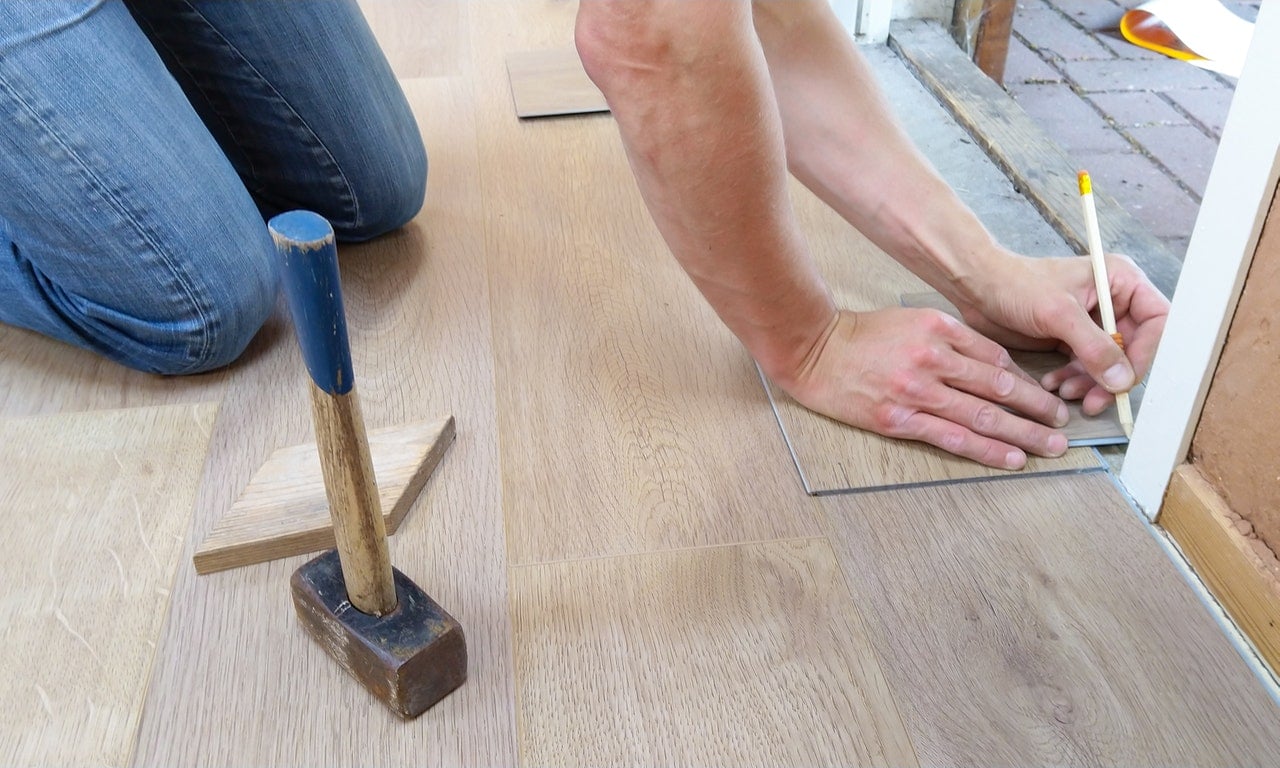You’ve seen how beautiful black vinyl plank flooring can be, so it is not surprising that a lot of people are turning to LVP flooring instead of laminate flooring or hardwood flooring.
LVP flooring is suitable for both residential and commercial applications, and it provides the perfect balance of aesthetics and durability, too. It is not far behind when it comes to the elegance of hardwood flooring, and it competes closely with laminate flooring, too.
Is VLP flooring waterproof? Yes, they are. This is one of the major advantages of LVP flooring over more traditional types of flooring, like laminate and hardwood floors.
Accidental water spills are not a problem as the surface of LVP maintains its beauty and shine despite these spills. The lower layers of the flooring maintain rigidity and do not warp just because of moisture. What this plainly shows is that LVP flooring is excellent for homes, where spills are common, especially when there are kids around. Modern LVP flooring is also free of phthalate-free that makes them safer for use in homes and commercial spaces.
Some brands of LVP are slip-resistant, which is essential if you are to place them in spaces like the bedroom and living room. No one likes slippery flooring – that would be an unnecessary danger.
You can also invest in the type of LVP flooring that fully suits your needs. Some brands offer panels that are straight out inspired by hardwood flooring, while others provide more high tech designs like 3D embossing to keep the realism high. LVP flooring is practical and beautiful and is an easy choice for homeowners who want to upgrade the style and look of their homes without breaking the bank.
LVP Flooring vs. Laminate
LVP flooring is extremely durable and can withstand many, many years of normal use well. It is waterproof but is prone to denting if you drop something heavy on it. LVP can be cleaned with non-abrasive mops and can also be steam-cleaned if you wish. It cannot be polished with wax-based polishes but is pet-friendly, so it’s perfect for homes with cats and dogs.
LVP is available in multiple finishes and appearances, as it mimics hardwood flooring. LVP can be installed via picking or through the peel and stick method. In years, the original design will remain but will eventually fade due to friction from walking on the surface of the LVP. Lengths of this type of paneling can reach up to two feet, four to inches wide for each panel.
Laminate flooring holds itself well against LVP in terms of durability. However, it is not waterproof, so it might not be a good choice for homes with pets as pets can cause spills, and they may also urinate or poop on the laminate flooring if they are not house-trained yet. Some polishing products designed for laminate flooring may be used to restore the shine.
Any chips and scratches on the surface can also be partially or fully restored or repaired using laminate-specific repair products. Prone to scratches instead of denting, so you have to be careful when moving around your furniture. In terms of variety, there’s also plenty of variety like LVP if you are after a hardwood look. The sizes of the panels are 36 inches to 48 inches vertically, and four to 16 inches horizontally.
LVP Flooring vs. Hardwood
While beautiful and classy, hardwood flooring is prone to all kinds of damage from normal wear and tear: denting, scratching, fading, etc. Therefore, it is one of the more demanding types of flooring and home surfaces you can install. However, don’t let this discourage you if you truly want hardwood flooring.
Hardwood panels are also not waterproof if they get soaked, they might take damage. Wood damage can be anything from slight discoloration to weakened panels that will sink when you step too heavily on them. Wet mops are obviously out of the question, so you must stock hardwood-specific surface cleaners.
On the bright side, wax-based polishes are very much welcome as wood lends well to wax and applying floor wax is the primary method of restoring the shine of wooden surfaces. Take note, however, that wax application only restores the surface shine temporarily and does not repair the finish of the wood panels.
Refinishing may be necessary later on. If you have pets at home, go for the hardest hardwood panels you can find, as pets can easily scratch the softer ones. Unlike LVP flooring, we do not recommend that you DIY hardwood panels.
You will have to hire a professional installer to make sure that everything is up to spec. The one thing that separates hardwood floors from LVP and laminate is that over time, the aesthetics of the panels become more and more natural, and while refinishing may be on the horizon, and people love the warm, classic look of partially faded hardwood floor. They have such character.
Disadvantages of Vinyl Plank Flooring
While few, vinyl plank flooring does carry with it some risks and problems:
- LVP cannot be repaired, unlike laminate and hardwood panels.
- LVP may emit VOCs or volatile organic compounds that aren’t healthy for the body.
- They have a shorter lifespan generally compared to original hardwood floors.
- They offer no impact to the resale value of a home in the United States, or if they do, it’s very minimal. Value is accorded to more expensive types of flooring, not LVP. In some cases, the presence of vinyl flooring may even hurt the resale value of a property. You may like it, but brokers, agents, and potential home buyers may not.
- If applied with an adhesive during installation, it may be challenging to remove them. LVPs are designed to stick and stay on, for better or worse.
- Usually not recyclable.

